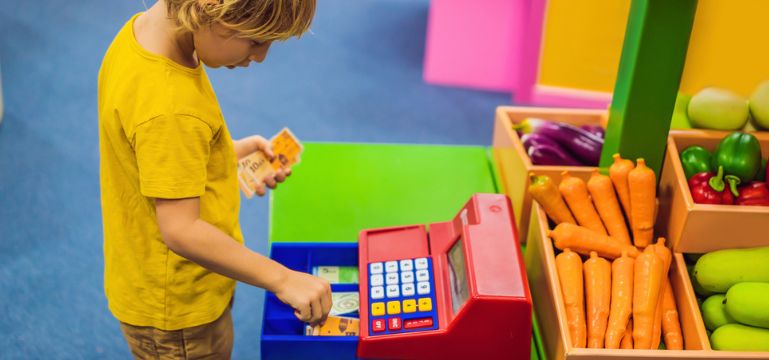Big Bocs Bwyd – a recipe for success!

Quick links:
Information about the school
Cwmfelin Primary School is situated in Maesteg, in Bridgend County Borough Council. The school provides education for pupils aged 3 to 11. There are currently 222 pupils on roll. Thirteen per cent of pupils are eligible for free school meals. The school has completed Phase 5 of the Healthy Schools Awards, achieved the Eco Platinum Flag and is a Silver Award, Rights Respecting School.
Context and background to the effective or innovative practice
The Big Bocs Bwyd (BBB) project, launched in October 2021, with a focus to tackle food poverty, reduce food waste and provide authentic learning experiences for our pupils. In the first year, leaders established food links with local businesses to ensure that a steady supply of food was provided. The project runs on a pay as you can basis, allowing people to pay what they can afford. The BBB is now self-sufficient and has a reliable customer base. From 2021 to present day, integrating the BBB into the Cwmfelin Curriculum has been the overarching focus, developing essential food literacy and basic life skills. Examples include the introduction of healthy cooking sessions, making meals on a budget, food tasting from around the world, money management and role play form an integral part of our school inquiries.
Description of nature of strategy or activity
Initially, all pupils participated in a Food Standards Agency (FSA) approved assembly, learning about food safety and hygiene. This prepared pupils to undertake activities linking to the BBB. Some examples of how the project has been implemented include:
Nursery and reception:
- Through work focused on the story ‘Pumpkin Soup’, pupils identified and collected vegetables from the bocs to cook and taste Harvest soup.
- Nursery pupils made Reindeer hot chocolate cones to be sold at the BBB, developing their skills to become enterprising individuals.
- While developing Welsh language skills, pupils translated shopping lists from English to Welsh.
- Pupils created their own shopping lists, writing ingredients to make porridge for Baby Bear and went ‘shopping’ for the items.
Year 1 to Year 3:
- Pupils used the BBB to develop skills such as counting money and calculating change.
- When exploring healthy eating, Year 3 chalked the Eatwell Plate outside the BBB and then chose real food items to create a healthy substantial meal. This supported their learning of food groups and knowledge of the eat well plate. Children then created a picnic for the Light House Keepers lunch, inviting parents to taste their food creations.
Year 4 to Year 6:
- Pupils contacted local companies, writing persuasive letters, to ask for further donations.
- Year 5 pupils organised a Café Cymraeg on the BBB decking, placing orders using their Welsh vocabulary.
- Older pupils experienced meal planning on a budget using strategies adopted by a local food bank to feed a family, whilst prioritising healthy choices.
A whole school project included making rainbow rice for Chinese New Year, tasting the rice then offering the products in pre-packed bags to make at home with family members.
What impact has this work had on provision and learners’ standards?
Introducing food technology and developing strong home school links through cooking are just some of the ways in which the BBB has further enhanced learning for pupils. Raising standards in food literacy and educating children about nutrition has supported pupils to become healthy, confident pupils.
The project has allowed the school to deliver fun, engaging sessions for all groups of learners. The BBB enhances the school’s provision, offering real-life experiences in an authentic context. As a result, literacy and numeracy standards are improving as the pupils are motivated to complete tasks linked to the BBB.
The project has provided meaningful work opportunities, where pupils have gained an insight into the world of work. Classes run the BBB on a rota system and take ownership by managing stock and establishing a cleaning routine. They sort deliveries, check use-by dates and ensure fridge/freezer temperatures are accurate and this contributes to their understanding of how a business is run. Pupil surveys have identified the positive attitude amongst our learners towards the project.
The BBB has impacted positively on staff, who now access a ready-made provision to enhance their classroom practice. Clear links can be made to all areas of learning. The BBB aligns closely with the schools work on environmental education, children’s rights and healthy living.
Following a further grant, an additional container has been purchased and adapted for use as a BBB kitchen. This well-resourced environment will provide pupils with a wider range of cookery experiences. Community links hope to be established in the future with plans for parent engagement and food literacy sessions.
How have you shared your good practice?
Leaders of the BBB have hosted meetings for other schools in the cluster and the wider area. Opportunities were given for schools to discuss best practise. Offering support and sharing ideas have been a priority for these sessions, assisting other schools with their start up process. Each half term, school leaders write a case study for the BBB website to share practise nationwide.